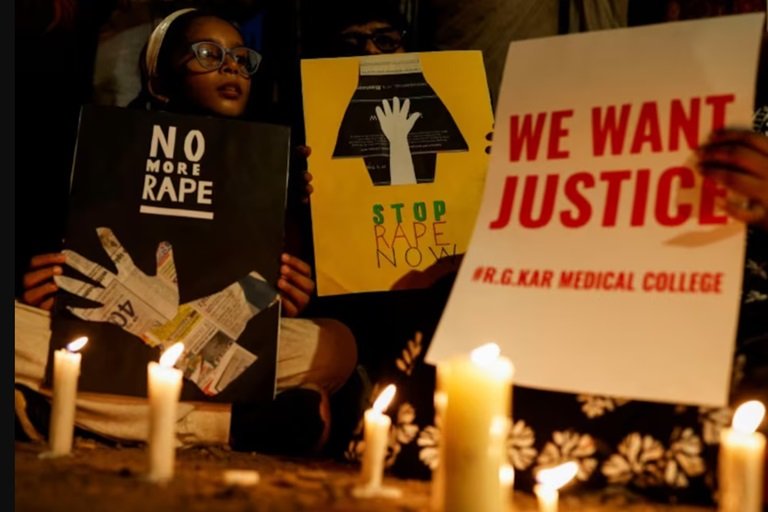An Indian court’s ruling that a man’s forced “unnatural sex” with his wife is not a crime has prompted widespread indignation and revived calls for better rights for married women.
The contentious judgment has also resurrected the topic of marital rape in a country that has consistently resisted criminalizing it.
Earlier this week, a high court judge in the central Indian state of Chhattisgarh released a 40-year-old man convicted by a trial court in 2019 of rape and unnatural intercourse with his wife, who died within hours of the alleged attack.
The lower court also ruled the guy guilty of “culpable homicide not amounting to murder.”. He was sentenced to “rigorous imprisonment for 10 years” on each offense, with all sentences to run concurrently.
However, on Monday, High Court Justice Narendra Kumar Vyas acquitted the man of all charges, stating that because India did not recognize marital rape, the spouse could not be held guilty of non-consensual intercourse or any other non-consensual unnatural sexual conduct.
The decision has sparked outrage, as activists, lawyers, and campaigners renew their calls to criminalize marital rape in India.
“To watch this man walk away is unacceptable. This judgment may be correct legally, but it is ethically and morally abhorrent,” said lawyer and gender rights activist Sukriti Chauhan.
“An order that absolves a man of such a crime, to say it’s not a crime, is the darkest hour in our legal system,” she told reporters.
“It has shaken us to the core. This needs to change and change quickly.”
According to Priyanka Shukla, a lawyer in Chhattisgarh, a decision like this “sends the message that because you’re the husband, you have rights.” And you can get away with anything, including murder.
She emphasized that this is not the first time a court has issued such a ruling, and there is always outrage.
“This time, the outrage is more because it is so gruesome and the woman died.”
The prosecution alleges that on December 11, 2017, the spouse, a driver, “committed unnatural sex with the victim against her will… causing her a lot of pain.”
After he departed for work, she sought assistance from his sister and another cousin, who transported her to the hospital, where she died a few hours later.
In her police statement and dying declaration to a magistrate, the woman stated that she became ill “due to forceful sexual intercourse by her husband.”.
A dying declaration carries weight in court, and legal experts believe it is often sufficient for conviction unless challenged by additional evidence.
In 2019, the trial court convicted the man based mainly on her deathbed declaration and the post-mortem report, which indicated “the cause of death was peritonitis and rectal perforation”—simply” put, severe injuries to her abdomen and rectum.
However, Justice Vyas saw things differently, questioning the “sanctity” of the dying confession, noting that several of the witnesses had reversed their claims, and, most importantly, stating that marital rape was not a crime in India.
Ms. Shukla described the lower court’s conviction as “one of the rarest of rare cases,” most likely due to the woman’s death.
“But what is shocking about the high court order is that there’s not even one sympathetic comment from the judge.”
Given the gravity of the assault, the high court’s decision has shocked many, who believe the judge should not have dismissed the case so easily.
India is one of more than 30 nations, including Pakistan, Afghanistan, and Saudi Arabia, where marital rape is not a criminal offense.
A number of petitions have been submitted in recent years aiming to overturn Section 375 of the Indian Penal Code, which has been in place since 1860.
Authorities also argue that there are sufficient regulations to protect married women from sexual abuse. However, advocates argue that India cannot use ancient laws to deny women physical agency.
“A lot of people say the constitution cannot enter your bedroom,” Ms. Chauhan said.
“But doesn’t it grant women—like all citizens—fundamental rights to safety and security? What kind of redundant country do we live in that we remain quiet when a woman has to face this level of violence?” she asks.
Violence in marriage is, according to reports, prevalent in India.
A recent government survey found that 32% of married women encounter physical, sexual, or emotional violence from their husbands, while 82% have experienced sexual violence from their husbands.
Even that does not capture the full scope of the problem, according to Ms. Shukla, because the vast majority of women do not disclose violence, particularly sexual abuse, due to shame.
“In my experience, women are not trusted when they complain; everyone says it must be fake. The only time such cases are taken seriously is when a woman dies or the assault is particularly gruesome,” the lawyer said.
Ms. Chauhan believes nothing will change until the law changes.
“We need to criminalize marital rape. The wife not getting justice after such a gruesome incident deserves a nationwide campaign, which is not born of anger but is serious [and] well thought out.”
She stated that the government and men’s activists try to project it as a “man versus woman debate.”
“But the demand for criminalizing marital rape is not against men, but for the safety and well-being of women. Is it not important to ensure women’s safety,” she asked.











